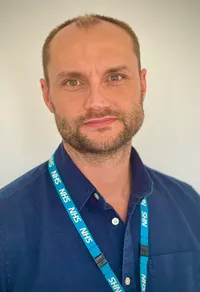The Graduate Perspective: Ollie Lawton


Dr Oliver Lawton was a medical student at Warwick Medical School between 2005 – 2009. He stayed local to the area as a junior doctor, became a GP and is now partner of a teaching practice in Leamington.
Professor Simon Brake, Chief Innovation & Engagement Officer for WMS, commented that “Ollie has been a great friend and support to the Medical School over the years since his graduation, whether through teaching and managing undergrad placements and VTS trainees, teaching and lecturing, as an examiner, and most recently, providing Covid-19 vaccinations and boosters to the medical students and clinically facing staff throughout the pandemic. Ollie’s generosity and collegiality is incredibly welcome, and only with his and others’ similar contributions and efforts are we able to carry on the excellent work of the Medical School in teaching, research and contributing to the NHS and caring for our community.”
Tell us about your time at WMS
I loved medical school. At the time there had only been a few cohorts before us as the course only started in 2000. There was a real family feeling about the place and team ethic that we were all in it together. We worked together, learned together, and socialised together. Your friends were the other medical school students. Because of your schedule there was less opportunity to meet others, so you formed strong bonds with your peers. The social side was particularly great with the opportunity to take part in a number of clubs and societies as well as nights out with friends.
Why did you choose to stay in the region to be a junior doctor?
I was from Oxfordshire anyway so fairly local but felt that it would be easier to work in the place that I had been a student. I had experience of the hospitals, knew who the consultants were and understood the systems. Lots of my friends chose to stay here too which was great as we were able to continue to work together and drew strength from one another when working long hours as junior doctors. Those strong friendships were forged early on and continue to this day. Friends I met at Medical School were the ushers at my wedding and are godparents to my children.
What made you want to work in Primary Care?
I decided I wanted to become a GP because of the experience I had on my placement at a practice in Shipston on Stour when I was a medical student. I found it really inspiring and enjoyable. I remember that placements were quite a good length of time, which meant you could really get involved and see if it was an area that appealed. For me it was such a positive experience it helped me make my decision about a career in general practice.
Being a GP certainly isn’t easy, especially in the last few years during Covid where there have been a number of significant challenges, but it still a fantastic job. Alongside working with patients and being a partner in my practice, I have taken on strategic roles such as: developing the local Covid vaccine programme, lifestyle programmes, establishing a social prescribing unit and setting up Covid hot clinics during the pandemic for those who were ill but not ill enough for hospital. It is important to me to be able to impact on healthcare and education within the community and these additional projects provide me with the balance I need to be the best doctor I can.
What is your involvement with the Medical School now?
It has always been important to me to give something back as I had had such a positive experience at WMS. We are after all developing the doctors of the future. We regularly have students on placement at my practice, Clarendon Lodge, in Leamington. I think it is really important to give them a positive experience on their placement and challenge any misconceptions they might have about being a GP. Consultation skills are paramount within general practice, and it is those skills I hope they hone while they are with us. They are all incredibly bright, intelligent students but being able to connect with patients and understand what their issues are and how to help them is vital.
I have until more recently also been an examiner on the MB ChB programme. I think it is important for the students to have someone who has been through it themselves and is able to coach them from a position of knowledge and experience.
When the pandemic hit in March 2020, the Primary Care Network that I am part of in Leamington developed a vaccination programme to deliver vaccines to key workers. We organised vaccinating 400 medical students early in the programme as we were aware that they were keen to return to the front line to work in hospitals as part of the pandemic effort. We also encouraged them to be vaccinators and support the programme as it was rolled out to the community in the region.
We talk about the Warwick doctor at WMS as being someone rather special who exhibits specific values: Kindness, academic rigour, integrity, support for others, humility, innovation and creativity. What is your experience of this?
I am always impressed by the maturity and attitude of the students, and they are always welcome at our Practice and I wouldn’t hesitate to give them a job. I think there is something to be said for the programme being graduate entry that helps with that and the close-knit group that is formed with the students and a culture of helping one another get through. Students are admitted onto the programme from different backgrounds, which is great and makes for a rich cohort of life experience.
What advice would you give to anyone considering medical school or preparing to be a junior doctor?
I love being a doctor and I wouldn’t want to do anything else. However, before you make the decision to apply make sure you have the right character for it. Historically those who have a great academic track record have been attracted to the profession, and while this is important, qualities such as resilience are very important as it can be a tough job physically and emotionally. If you care about other people and you are committed to helping others, then it can be hugely fulfilling.
If you are at Medical School already, I would say, make sure you enjoy it. Once you have graduated and look back you will realise that you never had it so good. It is a unique experience where you get to meet and work with like-minded people while being well looked after. Make sure you take the opportunities that are presented to you including the social ones as it is harder to do that once you are a junior doctor on the wards.

